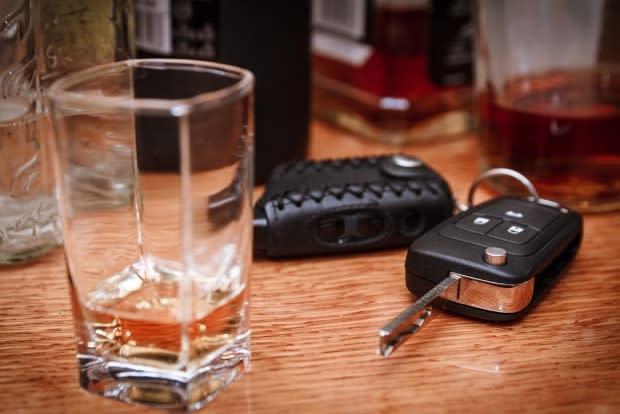Impaired drivers could be suspended, fined rather than charged under proposed Alberta law
The Alberta government wants to adopt a new way of penalizing impaired drivers that would keep people who have committed less serious offences out of court.
Should the Provincial Administrative Penalties Act pass the legislature, police who encounter an impaired driver could opt to avoid laying criminal charges.
Drivers dealt with through a new administrative penalty would lose their vehicle for 30 days, lose their driver's licence for at least three months and pay a $1,000 fine for a first offence.
Justice Minister Doug Schweitzer said Thursday that adopting an approach B.C. has used for the past decade will prevent fatal crashes and free up court and police time.
"This policy saves lives, full stop," Schweitzer said at a news conference in Edmonton.
Alberta law would also be changed so commercial drivers and novice drivers are allowed no detectable drugs or alcohol.
If passed, Bill 21 would also create a new government branch called SafeRoads AB to oversee less serious impaired driving cases, and, later in 2021, expand to handle traffic tickets.
Transportation Minister Ric McIver said Thursday the new approach is no attempt to trivialize impaired driving— police can still criminally charge drivers involved in serious collisions or repeat offenders.
"You injure someone, you kill someone in impaired driving, criminal charges are there immediately," Schweitzer said. "If you don't change your behaviour, criminal charges are there."
B.C.'s approach a model for Canada
The ministers pointed to the success of British Columbia's approach, which began in 2010. The number of impaired driving incidents dropped 36 per cent in that province between 2011 and 2018. Impaired driving fatalities there halved between 2010 and 2018.
If adopted, Alberta would be the third province to decriminalize some impaired driving offences after B.C. and Manitoba.
Mothers Against Drunk Driving (MADD) Canada has advocated for all provinces and territories to follow B.C.'s lead.

CEO Andrew Murie said the immediate and lengthy vehicle impoundment is what makes the program so successful. If a driver is criminally charged, they would lose their vehicle for a couple of days, then it could take a year before their case goes to trial, he said.
Although other provincial governments saw the success of B.C.'s program, many were waiting until a legal challenge of the program cleared the Supreme Court of Canada, he said.
In 2016, 57 people died in alcohol-related collisions in Alberta, a government report said. That year, a driver had consumed alcohol in 16 per cent of fatal crashes and had consumed drugs in about two per cent of crashes.
"All our members say across the country is they don't want this to happen to other families," Murie said.
Administrative efficiencies
By diverting cases away from courts, the Alberta government estimates it will free up about eight per cent of court time and eliminate about 1,200 trials a year.
The system is also supposed to save drivers time. They should be able to resolve their cases within 30 days using an online portal, rather than waiting months for a court date.
Police would be able to deal with an administrative penalty in less than an hour, rather than spending time testifying in court, Schweitzer said.
Edmonton police chief and Alberta Association of Chiefs of Police president Dale McFee said adopting the new system would be a positive step forward that would improve traffic safety.
However, Ian Savage, president of the Calgary-based Criminal Defence Lawyers' Association, said that efficiency will come at a cost to fairness.
Protesters around the world are decrying police brutality after a black Minneapolis man died when an officer pinned him to the ground. Alberta's bill gives police more unchecked powers that are destined to result in police more frequently stopping people of colour without justification, Savage said.
Diverting cases away from court allows police to dodge oversight, he said. An administrative appeal process is "meaningless," he said.
"All those protections for the citizens, the driver, are being taken away by this legislation."
Schweitzer said the system has withstood such legal tests in B.C. and contains safeguards.
If a driver wants to challenge their fine or licence suspension, a new system would allow them to request a case review online, then have a phone or video review hearing with an adjudicator within 21 days. Right now, a convicted driver must appear in person at an office or registry to file an appeal, then appear before a three-person panel, which can take up to five months.
Drivers who believe a first roadside breathalyzer or drug test yields an inaccurate result also have the right to ask for a second test using a different instrument.
What would change
As it stands, Alberta drivers caught the first time with blood alcohol levels between 0.05 milligrams and 0.079 mg per 100 millilitres will lose their driver's licence and vehicle for three days.
In the proposed bill, those drivers with lower blood alcohol limits would face the same sanctions, plus a $300 fine and a victim surcharge.
Today, a first-time offender driving with blood alcohol over 0.08 receives a three-day vehicle seizure, a 90-day licence suspension, followed by a year where the driver can drive if they use an Interlock ignition device.
Should Bill 21 pass, the driver would lose their vehicle for 30 days, lose their licence for 90 days, be required to participate in the Interlock program for 12 months, must attend an impaired driving education program and pay a $1,000 fine plus victim surcharge. The fines can rise with subsequent offences.

